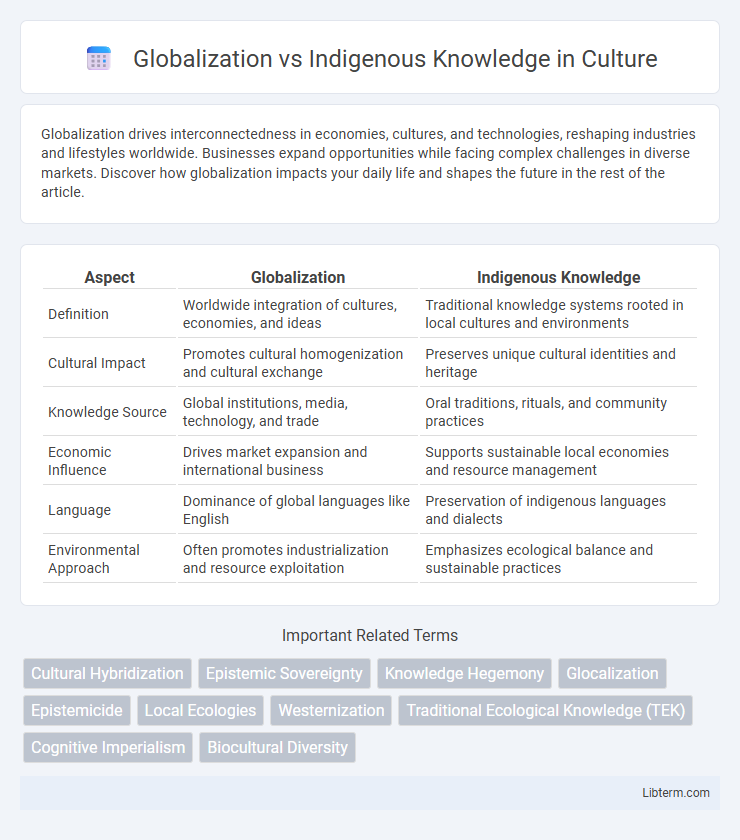Globalization drives interconnectedness in economies, cultures, and technologies, reshaping industries and lifestyles worldwide. Businesses expand opportunities while facing complex challenges in diverse markets. Discover how globalization impacts your daily life and shapes the future in the rest of the article.
Table of Comparison
| Aspect | Globalization | Indigenous Knowledge |
|---|---|---|
| Definition | Worldwide integration of cultures, economies, and ideas | Traditional knowledge systems rooted in local cultures and environments |
| Cultural Impact | Promotes cultural homogenization and cultural exchange | Preserves unique cultural identities and heritage |
| Knowledge Source | Global institutions, media, technology, and trade | Oral traditions, rituals, and community practices |
| Economic Influence | Drives market expansion and international business | Supports sustainable local economies and resource management |
| Language | Dominance of global languages like English | Preservation of indigenous languages and dialects |
| Environmental Approach | Often promotes industrialization and resource exploitation | Emphasizes ecological balance and sustainable practices |
Defining Globalization and Indigenous Knowledge
Globalization refers to the increasing interconnectedness and integration of economies, cultures, and populations driven by trade, communication technologies, and multinational corporations. Indigenous knowledge encompasses the longstanding traditions, practices, and wisdom developed by indigenous peoples, deeply rooted in their local environments and cultural heritage. Understanding the contrast between globalization's universalizing influence and indigenous knowledge's localized, context-specific insights is crucial for preserving cultural diversity and sustainable development.
Historical Contexts: Origins and Evolution
Globalization has its origins in ancient trade routes such as the Silk Road, evolving through maritime explorations and industrial revolutions that expanded cultural and economic exchanges worldwide. Indigenous knowledge systems, developed over millennia, are deeply rooted in local ecosystems and traditions, reflecting unique worldviews and sustainable practices. The historical interaction between globalization and indigenous knowledge often resulted in knowledge hybridization, but also significant challenges to the preservation of indigenous cultural and environmental heritage.
Cross-Cultural Interactions: Opportunities and Challenges
Cross-cultural interactions between globalization and indigenous knowledge create opportunities for cultural exchange, innovation, and shared problem-solving, enhancing global diversity and sustainability. However, these interactions also present challenges such as the risk of cultural homogenization, loss of indigenous languages, and intellectual property exploitation. Balancing the preservation of indigenous knowledge with the benefits of global integration requires respectful collaboration and equitable knowledge-sharing frameworks.
Impacts of Globalization on Indigenous Communities
Globalization significantly alters indigenous communities by introducing external economic pressures that undermine traditional livelihoods and cultural practices. The influx of global media and technology often leads to language loss and erosion of indigenous knowledge systems. Economic integration can result in land dispossession and environmental degradation, threatening the sustainability of indigenous ways of life.
Preserving Indigenous Knowledge in a Global Era
Preserving indigenous knowledge in a global era requires integrating traditional wisdom with modern technologies to safeguard cultural heritage against homogenizing forces of globalization. Efforts include documenting oral histories, promoting indigenous languages, and supporting community-led education programs that reinforce ancestral practices. Protecting intellectual property rights and fostering cross-cultural exchanges empower indigenous communities to maintain their identity while contributing to global diversity.
Knowledge Systems: Comparisons and Contrasts
Globalization promotes the widespread exchange of technological and scientific knowledge, leading to standardized education systems and modern innovations that often overshadow localized Indigenous knowledge systems rooted in cultural traditions and ecological wisdom. Indigenous knowledge systems emphasize holistic understanding, oral transmission, and long-term environmental stewardship, contrasting with globalization's emphasis on quantifiable data and global applicability. The interplay between these systems reveals tensions in preserving cultural identity while integrating global advancements, highlighting the need for inclusive frameworks that respect both universal science and indigenous epistemologies.
The Role of Technology in Knowledge Exchange
Technology plays a crucial role in the exchange between globalization and indigenous knowledge by facilitating digital platforms that preserve and share traditional wisdom. Advanced tools like geographic information systems (GIS) and social media enable indigenous communities to document and disseminate cultural practices while engaging with global audiences. This interplay enhances the visibility of indigenous knowledge systems and promotes cross-cultural collaboration without diminishing local identities.
Language, Identity, and Cultural Sustainability
Globalization often promotes dominant languages such as English, marginalizing indigenous languages and threatening cultural identity by homogenizing diverse worldviews. Indigenous knowledge systems, conveyed through native languages, are vital for preserving unique cultural practices and sustaining biodiversity. Protecting linguistic diversity enhances cultural sustainability by reinforcing community identity and resisting the erosion caused by global cultural convergence.
Policy Responses and Legal Protections
Policy responses to globalization's impact on indigenous knowledge emphasize the integration of traditional practices into national development frameworks to ensure cultural preservation and sustainable resource management. Legal protections such as the Convention on Biological Diversity and the Nagoya Protocol establish rights over indigenous knowledge and promote equitable benefit-sharing from its use. Strengthening intellectual property rights and implementing community-based governance models further safeguard indigenous knowledge against exploitation in the context of global economic pressures.
Towards Inclusive and Equitable Knowledge Futures
Globalization often prioritizes standardized knowledge systems, marginalizing indigenous knowledge that embodies diverse cultural perspectives and sustainable practices. Emphasizing equitable knowledge futures requires integrating indigenous epistemologies with global frameworks to foster inclusivity, respect for local wisdom, and resilience. This approach promotes collaborative innovation that values both traditional insights and contemporary advancements, ensuring diverse contributions shape global development.
Globalization Infographic

 libterm.com
libterm.com